
MEMANTINE VIATRIS 5 mg/dose ORAL SOLUTION
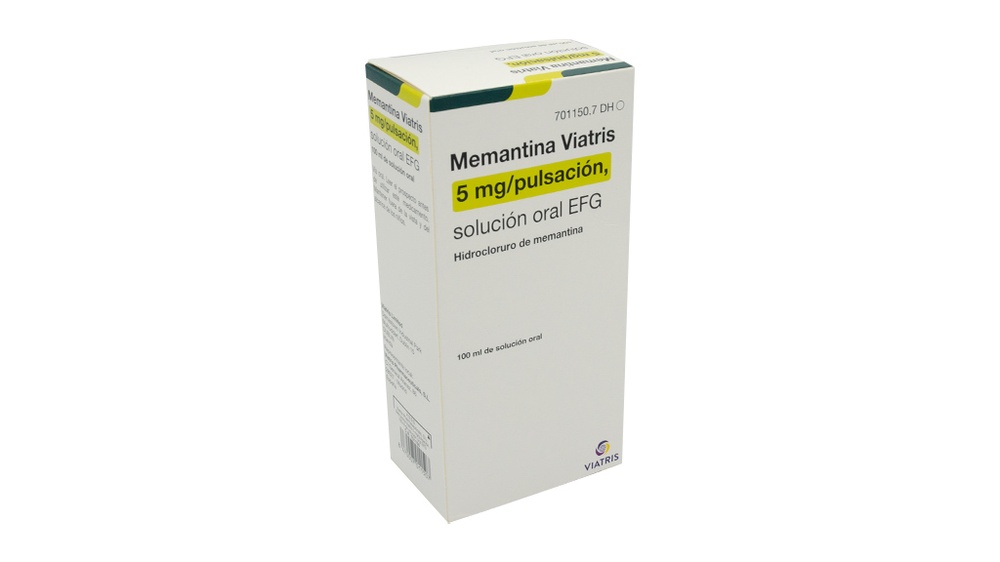

How to use MEMANTINE VIATRIS 5 mg/dose ORAL SOLUTION
Translated with AI
This page provides general information and does not replace a doctor’s consultation. Always consult a doctor before taking any medication. Seek urgent medical care if symptoms are severe.
Show originalContents of the leaflet
Introduction
PACKAGE LEAFLET: INFORMATION FOR THE USER
Memantina Viatris 5 mg/puff, oral solution EFG
Memantine hydrochloride
Read the package leaflet carefully before starting to take this medicine because it contains important information for you.
- Keep this package leaflet, you may need to read it again.
- If you have any further questions, ask your doctor or pharmacist.
- This medicine has been prescribed for you only. Do not pass it on to others. It may harm them, even if their signs of illness are the same as yours.
- If you experience any side effects, talk to your doctor or pharmacist. This includes any possible side effects not listed in this leaflet. See section 4.
Contents of the package leaflet
- What is Memantina Viatris and what is it used for
- What you need to know before taking Memantina Viatris
- How to take Memantina Viatris
- Possible side effects
- Storage of Memantina Viatris
- Package contents and further information
1. What is Memantina Viatris and what is it used for
Memantina Viatris contains memantine hydrochloride as the active substance. It belongs to a group of medicines known as anti-dementia medicines.
Memory loss in Alzheimer's disease is due to an alteration in brain signals. The brain contains so-called N-methyl-D-aspartate (NMDA) receptors that participate in the transmission of important nerve signals in learning and memory. Memantina Viatris belongs to the group of medicines called NMDA receptor antagonists. Memantina Viatris acts on these receptors, improving the transmission of nerve signals and memory.
Memantina Viatris is used in the treatment of patients with moderate to severe Alzheimer's disease.
2. What you need to know before taking Memantina Viatris
Do not take Memantina Viatris
- If you are allergic to memantine hydrochloride or any of the other ingredients of this medicine (listed in section 6).
Warnings and precautions
Talk to your doctor or pharmacist before starting to take Memantina Viatris
- If you have a history of epileptic seizures.
- If you have recently had a myocardial infarction (heart attack), if you suffer from congestive heart failure or if you have uncontrolled high blood pressure.
In these situations, treatment should be carefully supervised and your doctor should regularly reassess the clinical benefit of memantine.
If you have kidney problems, your doctor should closely monitor your kidney function and, if necessary, adjust the dose of memantine.
The use of memantine with other medicines such as amantadine (for the treatment of Parkinson's disease), ketamine (a medicine generally used to produce anesthesia), dextromethorphan (a medicine for the treatment of cough) and other NMDA antagonists should be avoided.
Children and adolescents
The use of memantine is not recommended in children and adolescents under 18 years of age.
Other medicines and Memantina Viatris
Tell your doctor or pharmacist if you are taking, have recently taken, or might take any other medicines.
In particular, the administration of memantine may produce changes in the effects of the following medicines, so your doctor may need to adjust the dose:
- Amantadine, ketamine, dextromethorphan.
- Dantrolene, baclofen.
- Cimetidine, ranitidine, procainamide, quinidine, quinine, nicotine.
- Hydrochlorothiazide (or any combination with hydrochlorothiazide).
- Anticholinergics (substances generally used to treat movement disorders or intestinal spasms).
- Anticonvulsants (substances used to prevent and eliminate convulsions).
- Barbiturates (substances generally used to induce sleep).
- Dopaminergic agonists (substances such as L-dopa, bromocriptine).
- Neuroleptics (substances used in the treatment of mental illnesses).
- Oral anticoagulants.
If you are hospitalized, inform your doctor that you are taking Memantina Viatris.
Taking Memantina Viatris with food and drinks
You should inform your doctor if you have recently changed or intend to change your diet substantially (e.g., from a normal diet to a strict vegetarian diet) or if you have renal tubular acidosis (RTA, excess of acid-producing substances in the blood due to kidney dysfunction) or severe urinary tract infections (urine conduit), as your doctor may need to adjust the dose of the medicine.
Pregnancy and breastfeeding
If you are pregnant or breastfeeding, think you may be pregnant, or plan to become pregnant, consult your doctor or pharmacist before using this medicine.
Pregnancy
The use of memantine is not recommended during pregnancy.
Breastfeeding
Women taking memantine should stop breastfeeding.
Driving and using machines
Your doctor will inform you if your illness allows you to drive and use machines safely.
Also, memantine may alter your reaction ability, so driving or operating machines may be inappropriate.
Memantina Viatris contains sorbitol
This medicine contains 36 mg of sorbitol in each 0.5 ml, which is equivalent to 72 mg/ml.
3. How to take Memantina Viatris
Follow the administration instructions of Memantina Viatris indicated by your doctor or pharmacist. In case of doubt, ask your doctor or pharmacist.
Posology
Please follow the instructions below when using the doser. Pictograms with the necessary instructions for the correct use of the doser are attached.
One puff contains 5 mg of memantine hydrochloride.
The recommended dose of Memantina Viatris in adult patients and elderly patients is four puffs of the doser, which is equivalent to 20 mg administered once a day. To reduce the risk of side effects, this dose is gradually reached by following the following daily treatment scheme:
Week 1 | One puff of the doser (equivalent to 0.5 ml) |
Week 2 | Two puffs of the doser (equivalent to 1 ml) |
Week 3 | Three puffs of the doser (equivalent to 1.5 ml) |
Week 4 and subsequent weeks | Four puffs of the doser (equivalent to 2 ml) |
The usual starting dose is one puff (5 mg) once a day for the first week. This dose is increased in the second week to two puffs once a day (10 mg) and in the third week to three puffs once a day (15 mg). From the fourth week onwards, the recommended dose is four puffs once a day (20 mg).
Dosage for patients with renal impairment
If you have kidney problems, your doctor will decide on the appropriate dose for your condition. In this case, your doctor should periodically monitor your kidney function.
Administration
Memantina Viatris should be administered orally once a day. To get the most out of your medication, you should take it every day and at the same time. The solution should be taken with a little water. The solution can be taken with or without food.
For detailed instructions on the preparation and handling of the product, see the end of this package leaflet.
Duration of treatment
Continue taking Memantina Viatris as long as it is beneficial for you. Your doctor should periodically evaluate the effects of your treatment.
If you take more Memantina Viatris than you should
- In case of overdose or accidental ingestion, consult your doctor or pharmacist immediately or call the Toxicology Information Service, telephone 91 562 04 20, indicating the medicine and the amount ingested.
- Generally, taking an excessive amount of Memantina Viatris should not cause you any harm. You may experience an increase in the symptoms described in section 4 "Possible side effects".
If you forget to take Memantina Viatris
If you realize that you have forgotten to take your dose of Memantina Viatris, wait and take the next dose at the usual time. Do not take a double dose to make up for the forgotten dose.
If you have any other questions about the use of this medicine, ask your doctor or pharmacist.
4. Possible side effects
Like all medicines, this medicine can cause side effects, although not everybody gets them.
Generally, side effects are classified as mild to moderate.
Frequent (may affect up to 1 in 10 people):
- Headache, drowsiness, constipation, elevated liver function tests, dizziness, balance disorder, difficult breathing, high blood pressure, and hypersensitivity to the medicine.
Uncommon (may affect up to 1 in 100 people):
- Fatigue, fungal infections, confusion, hallucinations, vomiting, gait disturbance, heart failure, and venous thrombosis/thromboembolism.
Rare (may affect up to 1 in 10,000 people):
- Seizures.
Frequency not known (frequency cannot be estimated from the available data):
- Pancreatitis, hepatitis, and psychotic reactions.
Alzheimer's disease has been associated with depression, suicidal ideation, and suicide. These events have been reported in patients treated with memantine.
Reporting of side effects
If you experience any side effects, talk to your doctor or pharmacist. This includes any possible side effects not listed in this package leaflet. You can also report side effects directly through the Spanish Pharmacovigilance System for Human Use Medicines: https://www.notificaram.es. By reporting side effects, you can help provide more information on the safety of this medicine.
5. Storage of Memantina Viatris
Keep this medicine out of the sight and reach of children.
Do not use this medicine after the expiry date which is stated on the carton and on the label of the bottle after EXP. The expiry date is the last day of the month indicated.
This medicine does not require any special storage conditions.
Once opened, the contents of the bottle should be used within 12 weeks.
The bottle with the doser attached should be stored and transported only in an upright position.
Medicines should not be disposed of via wastewater or household waste. Place the packaging and any unused medicine in the SIGRE collection point at your pharmacy. If you have any further questions, ask your pharmacist how to dispose of the packaging and any unused medicine. This will help protect the environment.
6. Package contents and further information
Composition of Memantina Viatris
The active substance is memantine hydrochloride.
Each puff of the doser releases 0.5 ml of solution, which contains 5 mg of memantine hydrochloride, equivalent to 4.16 mg of memantine.
Each ml of solution contains 10 mg of memantine hydrochloride.
The other ingredients are: potassium sorbate E-202, non-crystallizing sorbitol liquid (E-420), and purified water.
Appearance of the product and package contents
Memantina Viatris oral solution is a clear, colorless to slightly yellowish solution.
Memantina Viatris oral solution is available in bottles of 50 ml, 100 ml, or 10 x 50 ml.
A doser is included.
Not all pack sizes may be marketed.
Marketing authorization holder
Viatris Limited
Damastown Industrial Park
Mulhuddart, Dublin 15
Dublin
Ireland
Manufacturer
Chanelle Medical Unlimited Company
Dublin Road, Loughrea, Co. Galway,
Ireland
You can request more information about this medicine by contacting the local representative of the marketing authorization holder:
Viatris Pharmaceuticals, S.L.U.
C/ General Aranaz, 86
28027 - Madrid
Spain
This medicine is authorized in the Member States of the European Economic Area under the following names
Germany Memantinhydrochlorid beta 10 mg/ml Lösung zum Einnehmen
Italy MEMANTINA DOC
Spain Memantina Viatris 5 mg/puff, oral solution EFG
Netherlands Memantine 10 mg/ml drank
United Kingdom Memantine Hydrochloride 10 mg/ml oral solution
Slovak Republic Memantin Chanelle 10 mg/ml perorálny roztok
Date of the last revision of this package leaflet: May 2021
Detailed information on this medicine is available on the website of the Spanish Agency for Medicines and Health Products (AEMPS) http://www.aemps.gob.es/
Instructions for the correct use of the doser
The solution should not be poured or dispensed directly into the mouth from the bottle or doser. Measure the dose in a spoon or in a glass of water using the doser.
Remove the screw cap from the bottle:
The cap should be turned counterclockwise, completely unscrewed, and removed (fig. 1).
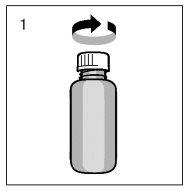
Assembling the doser on the bottle:
Remove the doser from the plastic bag (fig. 2) and place it on top of the bottle. Carefully insert the plastic tube into the bottle. Keep the doser on the neck of the bottle and turn it clockwise until it is firmly attached (fig. 3). The doser should only be screwed on once when starting use and should never be unscrewed.
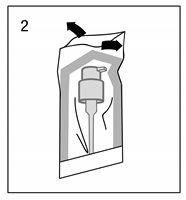
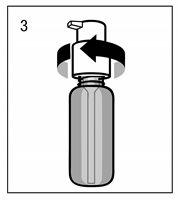
How the doser works:
The doser head has two positions and turns easily:
- counterclockwise to open and
- clockwise to close.
The doser head should not be pressed down while it is in the closed position. The solution can only be dispensed in the open position. To open, turn the doser head in the direction indicated by the arrow until it cannot be turned any further (about one-eighth of a turn, fig. 4). The doser is then ready for use.
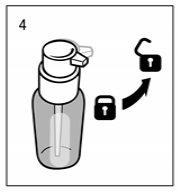

Preparing the doser:
When used for the first time, the doser does not dispense the correct amount of oral solution. Therefore, it must be prepared (primed) by pressing the doser head down completely five times in a row (fig. 5).
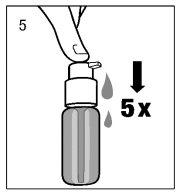
The solution thus dispensed should be discarded. The next time the doser head is pressed down completely (equivalent to one puff), it already dispenses the correct dose (fig. 6).
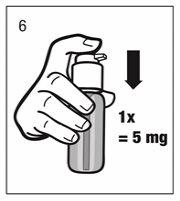

Correct use of the doser:
Place the bottle on a flat and horizontal surface, for example, on a table, and use it only in an upright position. Place a glass with a little water or a spoon under the spout. Press the doser head down firmly but calmly, in a sustained and not too slow manner (fig. 7 and fig. 8).
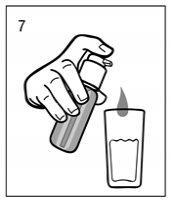

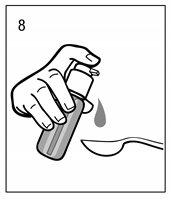

Then, the doser head can be released and will be ready for the next puff.
The doser should only be used with the Memantina Viatris solution in the provided bottle, not for other products or containers. If the doser does not work correctly, consult your doctor or pharmacist. Close the doser after using Memantina Viatris.
- Country of registration
- Active substance
- Prescription requiredYes
- Manufacturer
- This information is for reference only and does not constitute medical advice. Always consult a doctor before taking any medication. Oladoctor is not responsible for medical decisions based on this content.
- Alternatives to MEMANTINE VIATRIS 5 mg/dose ORAL SOLUTIONDosage form: TABLET, 10 mgActive substance: memantineManufacturer: Merz Pharmaceuticals GmbhPrescription requiredDosage form: TABLET, 10 mgActive substance: memantineManufacturer: Merz Pharmaceuticals GmbhPrescription requiredDosage form: TABLET, 20 mgActive substance: memantineManufacturer: Merz Pharmaceuticals GmbhPrescription required
Online doctors for MEMANTINE VIATRIS 5 mg/dose ORAL SOLUTION
Discuss questions about MEMANTINE VIATRIS 5 mg/dose ORAL SOLUTION, including use, safety considerations and prescription review, subject to medical assessment and local regulations.
Frequently Asked Questions














